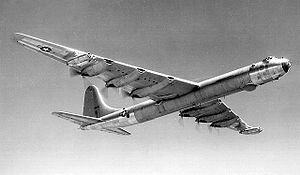B-36
| B-36 "Peacemaker" | |
|---|---|
 |
|
| The B-36D used both piston and jet engines. | |
| Role | Strategic bomber |
| National origin | United States |
| Manufacturer | Convair |
| First flight | 8 August 1946 |
| Introduction | 1949 |
| Retired | 12 February 1959 |
| Primary user | United States Air Force |
| Produced | 1946–1954 |
| Number built | 384 |
| Unit cost |
US$4.1 million (B-36D)
|
| Variants |
Convair XC-99 Convair NB-36H Convair X-6 |
| Developed into | Convair YB-60 |
The Convair B-36 "Peacemaker" was a strategic bomber built by Convair and operated solely by the United States Air Force (USAF) from 1949 to 1959. The B-36 is the largest mass-produced piston-engined aircraft ever built. It had the longest wingspan of any combat aircraft ever built, at 230 ft (70.1 m). The B-36 was the first bomber capable of delivering any of the nuclear weapons in the U.S. arsenal from inside its four bomb bays without aircraft modifications. With a range of 10,000 mi (16,000 km) and a maximum payload of 87,200 lb (39,600 kg), the B-36 was capable of intercontinental flight without refuelling.
Entering service in 1948, the B-36 was the primary nuclear weapons delivery vehicle of the Strategic Air Command (SAC) until it was replaced by the jet-powered Boeing B-52 Stratofortress from 1955. All but five examples were scrapped.
The genesis of the B-36 can be traced to early 1941, prior to the entry of the United States into World War II. At the time it appeared there was a very real chance that Britain might fall to the Nazi "Blitz", making a strategic bombing effort by the United States Army Air Corps (USAAC) against Germany impossible with the aircraft of the time. The United States would need a new class of bomber which would reach Europe and return to bases in North America, necessitating a combat range of at least 5,700 miles (9,200 km), the length of a Gander, Newfoundland–Berlin round trip. The USAAC therefore sought a bomber of truly intercontinental range, similar to the German RLM's ultra-long-range Amerika Bomber program, which itself as a 33-page proposal was submitted to Reichsmarschall Hermann Goering on May 12, 1942 at the RLM.
...
Wikipedia
